#an actual dictatorial murderous tyrant
Explore tagged Tumblr posts
Text
Going off of the idea that the prank was the start of Bridget’s fall to darkness and not actually the only catalyst. I feel like the start of Bridget’s reign as Queen of Hearts had a sort of Caligula situation.
She’s starts pretty good and beloved and really does want the people to love her. But with her already giving into crueler behaviors at school, she starts showing those traits again. And unlike at school, she isn’t getting punished or negatively affected by these actions outside of people fearing her. She’s the Queen after all. And after so long being picked on and viewed as weak, that fear just makes her feel more powerful. So it just gets worse.
She starts getting angry easier and becomes quicker to punish. Until eventually months in she finally does her first beheading. And that’s like the point of no return. She has now executed someone. Someone is dead at her command. And… nothing happens. Everyone accepts it because they have to and she sees no consequences to it. And she fully accepts that ruling with fear is a lot better than ruling with love when you’re an absolute monarch with complete immunity to consequences.
#she’s on the mind and the period between the prank and her descent into like#an actual dictatorial murderous tyrant#is constantly on the mind#especially because I think there has to be some systemic (Y’know like being an absolute monarch) to really encourage#her mass murdering behaviors#bridget descendants#Bridget hearts#Queen of hearts#disney descendants#descendants: the rise of red#rise of red#descendants
78 notes
·
View notes
Text
Reflections on the Ides of March
After all the excitement yesterday about the assassination of Julius Caesar, I think it's worth mentioning that Julius Caesar's death being celebrated as the common man's answer to tyranny is a little like celebrating the Mayflower Pilgrims for being on the side of religious tolerance.
Like, the Mayflower Pilgrims emigrated from England because England wasn't religiously controlling enough for them. They wanted more religious tyranny and were upset that the government was too moderate for their liking in allowing other ways of life.
In a bit of a distant parallel (bear with me, ADHD connection brain go brrrr) Julius Caesar first made enemies among the aristocrats who eventually murdered him by being a populist endeavoring to solve Rome's growing inequality issues by bringing land reform to Rome specifically targeted at redistributing land that had been gobbled up by the rich and powerful to give it back to its people.
It's a little complicated because, yes, Caesar's move to dub himself dictator for life was absolutely an authoritarian move. In addition, Augustus and subsequent European authoritarians/monarchs (I believe we should use the term more interchangeably tbh) used "Caesar" as a title and justified their reign going back to him via Augustus's eventual ascendence as his heir after a bitter power struggle and killing off all his other rivals who could claim that title, and thus brought an end to the (already tottering) Roman Republic. This puts Caesar as a step on the path to a reduction of a form of non-authoritarian rule.
But tyrant, as Caesar was referred to by those who assassinated him, in the ancient sense had a subtly different meaning. A tyrant was usually a figure who gained popularity among the masses by becoming their advocate against the rich and powerful and who ascended to power usually on the wave of a cult of personality and promises of egalitarian reform. They rarely established dynasties because the skills needed to reach their position of power rarely appeared in their biological heirs and without the structure of a monarchy to pass that mantle of authority onto their sons and heirs, the power structure of that tyrant usually fell apart upon their death.
Basically, one really magnetic person would occasionally rise up when the rich and powerful had gone too far in the societal imbalance. Rich aristocrats hated that. The enemy of most classical tyrants were the rich and powerful. Tyrants were populist leaders who usually took power for life (often, a rather short one if they couldn't keep the reins of power well in hand). This is a part of the rather complex political history of "rule by the people" and how it wasn't always a straight line from "rule by one" straight to democracy, sometimes a single authoritarian dictator/tyrant actually was the representative of the common man in confrontation against the accumulation of power by oligarchs.
So, Julius Caesar is a bit of a complicated figure here, because he rose to power by being a champion of the common man, in a tradition in Rome going back to the ill-fated Gracchi. By taking "dictator for life" powers, he was feared to be setting himself up as a king, or rather as a tyrant by Roman Senators, all wealthy aristocrats and by today's standards, oligarchs. Rome originally became a Republic, historically, when a Brutus family member assassinated the then-Etruscan tyrant so Rome could rule itself (or rather, could be ruled by its own oligarchs, which was much more democratic before it exploded into an empire by Caesar's time).
But the material damage the Roman Senators feared from Caear was just as much that he would take their land and money from them with that dictatorial power in order to repair the desperately crumbling "middle class" (term used loosely as it does not directly translate) which had been picked clean and robbed blind by the aristocrats over the past century or so in Rome since the Punic Wars. Caesar was championing anti-poverty measure that was looking out for the actual common citizens of Rome, something the Roman Senators did not want Caesar to do because it would bite into their wealth.
This makes it rather bitterly ironic that the common people today celebrate Caesar's death when, at the time, one of the reasons he was murdered was for being the champion of the common man. However, it is an understandable irony given how Caesar's legacy would be used by authoritarians after his death, up to and including in modern times.
#history#julius caesar#tagamemnon#ancient history#ancient rome#look any classicist is gonna spot all my oversimplifications here#this is a 101 Classics point I'm making so please no pedants in the comments
243 notes
·
View notes
Text
Sky
Perhaps this will be hard to read. Laments often are. It may bring you comfort, or it may make you angry. It may make you think more of me, or less. It may offend you. Rest assured, it offends me. So be it.
Once upon a time, there was a man who spoke of torture as a good in and of itself, to be pursued whether it was effective or not. Who promised to use the power of the state to enact violence upon scapegoated religious and ethnic minorities. Who insisted upon framing our struggle against Mideast terror groups in the same religious terms the terrorists themselves insist upon. Who praised himself for nursing petty grudges, for treating revenge as justice. Who threatened the free press with retaliation for reporting certain truths about him. Who bragged about sexual assault. Who mocked people more brave than himself and called their bravery weakness. Who lied seemingly without strategy, as if lies were good to tell only for the telling, who showed a shocking indifference to the very concept of truth. Who praised brutal dictators for their brutal methods. Who seemed (and seems) to be receiving shadowy support from a brutal dictator. Who claimed dictatorial power for himself.

This is fine.
He appeared entirely confused about the basic facts of geopolitical reality, or of how our government works, or even of the function within our government of the role he proposed to take on. He had a clear and obvious history of fraud and hucksterism, of enriching himself at the benefit of others with less leverage, and was even engaged throughout his campaign in a lawsuit for defrauding college students, since settled for $25 million dollars. He speculated with frightening casualness about destabilizing actions: proliferation and even use of nuclear weapons, defaulting on our debts and our treaties, backing out of our most long-standing alliances. He publicly called upon the intelligence apparatuses of foreign governments to intercede in our election on his behalf, and it seems increasingly likely they may have obliged. He whipped his crowds into frenzies, then directed their ire toward journalists reporting the event, many of whom he threatened to prosecute once in power. He offered to imprison his political adversary, to the delight of his chanting crowds, who wore t-shirts decorated with the flag celebrating the war to preserve American slavery, decorated with vulgar slogans of violence and rage. He promised to steer us directly into the deadly heart of the oncoming climate catastrophe; having claimed the work of men more intelligent and knowledgeable than he was nothing but a Chinese hoax, he sneered at the very idea of new energy sources.

This is fine.
That’s a short list. It’s a hell of a short list. But wait, listen: The people went for it.
Tens of millions of people voted to make him the most powerful man in the world. He will soon have the ability to blast the planet to an irradiated cinder, if he sees fit. He will continue to run his business, which appears to involve sitting in a golden throne and putting his names on things. He's given every indication, despite some laughably thin feints toward divestment, he will run that business from the Oval Office. Maybe he’ll even put his name on new things, like laws. Laws: a whole new product line for Trump International, and a potentially lucrative one. He owes the banks of foreign powers millions and millions of dollars. One wonders what laws they’ll want passed. Word is, his first foreign trip will be to visit Vladimir Putin. Heigh-ho.

His party is in control, too. They don't seem bothered by any of this. They're a bit more focused on providing checks and balances upon ethics watchdogs who have pointed out their party leader's multifarious and historically unprecedented infractions. They'd rather ignore those, so they can immediately—immediately—get down to the serious business of divesting millions and millions of the most vulnerable people in our society from the only chance they have at affordable health coverage. They plan to replace this program with something...someday. Their speculation so far indicates they will be replacing it with the opportunity to save up hundreds of thousands of dollars to pay for medical bills if you need them someday, or, if you don't have hundreds of thousands of spare dollars, to maybe go screw yourself. So, a lot of people are going to die in coming years, that would otherwise have lived, and they're rushing to make it happen. My, look at them laugh.

Republican lawmakers sign legislation to repeal ACA and defund women's health care access through Planned Parenthood, January 2016
Meanwhile, they're ignoring as peccadilloes the caricatured infractions of a man who intends to keep his own private security detail around him, who expounds upon provable lies, and then when exposed simply doubles down on the lie, who is considering throwing the press out of the White House, and other maneuvers straight out of the dictator handbook. It's really something to see. It's a new order, trumping the old. Isn't it great again?
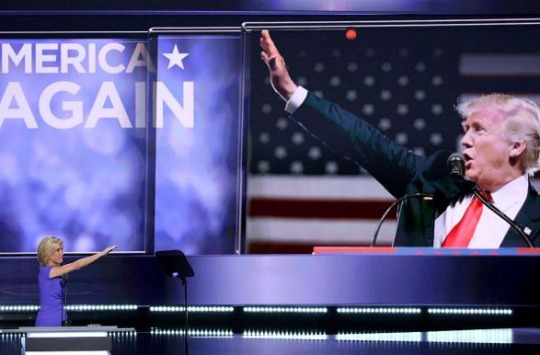
Laura Ingraham, speaker at the Republican National Convention, 2016.
It���s hard to understand what people hoped for from him other than this. It’s hard not to assume they were responding to the shockingly frank bigotry, his promises to return to an earlier time, the knowing use of slogans used byracists and fascists of days past. These are certainly what seemed to generate all the most popular applause lines. But I don’t want to think that of my country or my fellow citizens. I really want it to be something else. Let us consider other possibilities. Many seem to think that a great thing about him was his frankness. They liked that he “tells it the way it is.” Then again, those same people seemed most likely to think that he didn’t really mean his more shocking proposals. It’s a bit confusing, then, parsing what is meant by ‘telling it like it is,' as it appears to rely on selective trust in insincerity. Many voters, excited by promises to “drain the swamp,” but now disappointed by the recent appointment of a Goldman Sachs foreclosure kingpin to Treasury, of a Putin-connected oil executive to State, and by other signals the new president has given about his eagerness to rob us all blind, have been admonished by a key advisor for taking his words so literally. The 'alt-right' Neo Nazis and the KKK are very excited, for what it’s worth, about the more shocking proposals, and they remain confident our new leader meant every word.

You're really going to want to go to video on this one.
Some people thought he would be less likely to make them pay more in taxes, I suppose. So perhaps at last now we know the answer to the old hypothetical about whether we’d be willing to travel through time and sacrifice our lives to prevent the rise of a self-professing tyrant. Answer: We wouldn’t even suffer a hypothetical increase in our income taxes. I'm told folks voted for Trump because they were tired of being called racist. I imagine that was hard for them—who wants to be considered racist? If this complaint is yours, I imagine reading this (if you're still reading) is also hard. I sympathize; it's not particularly easy to write. But then again, the response seems an odd retort to the complaint. If your persistent problem is people keep telling you there is spinach in your teeth, you might consider getting a mirror and taking a look, rather than voting for the Jolly Green Giant running on a platform of outlawing all floss. And, perhaps, if it is painful to be considered racist, consider this: it may be all the more painful to live under racist oppression.
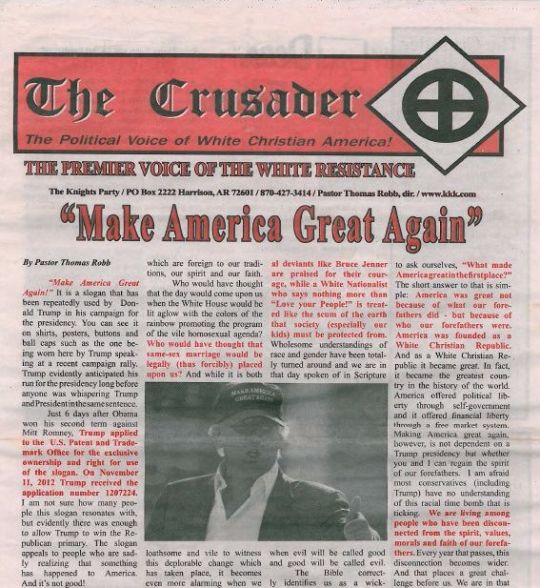
KKK Newspaper, The Crusader, endorses Trump.
Many seem to have mainly enjoyed that he wasn’t Hillary Clinton, and it’s certainly true to say many concerns and criticisms could be levied against her. But the man they voted for as an alternative already stood actualized as the cartoon parody of any potential danger she may have hypothetically posed. Bad judgment? Corruption? Fraud? A proclivity to violent retaliation? A worry about temperament? Untrustworthiness? Lack of transparency? It’s hard to believe this all had much to do with Hillary Clinton and her faults. Hard to believe this list of concerns would yours, but your acceptable alternative would be Donald Trump.
Or maybe they believed the more lurid stories, the debunked, the ridiculous. Hillary’s murdered 80 people close to her. She invented cancer and put it in your cell phone battery. She is secretly seven tiny demons all stacked up in a pantsuit and glued together with the blood of aborted fetuses. She controls the Yosemite supervolcano, along with a cabal comprised of George Soros and 17 other Jewish industrialists. I don’t know what all. I know there are people like this, who have seceded from objective reality into a dystopian alternate dimension, where they can perhaps supplement the powerlessness they feel in their lives with the comfort of false control, of being one of the few with the secret knowledge unavailable to the masses. I don’t know what to do with them, because they live in an alternate dimension. And, it must be said, I don’t think there are 63 million of them.
So here we are. In grave moral and physical danger. All of us. And for what? I’ve heard the same line again and again since the election: “America isn’t a different country today than it was before the election.” Jon Stewart trotted it out. I think I heard it from President Obama.
I fear I agree with the statement. I’m puzzled, though, because I think it is meant to be reassuring, to think we’ve always been the country capable of such a choice.
The statement doesn’t imply that we’re still great. It implies that we were never good.
It has to be admitted, people responded to Trump for what he is. Which means we are left with the statements and proposals by which he distinguished himself. And millions of us—tens of millions—preferred him specifically for his points of difference. Excited by his promises to return us to a time when our system existed only for certain people, and the preferences and needs of all others were beneath consideration, or at least willing to overlook that, in favor of some material or policy advantage somewhere. And ultimately, the reason is immaterial. A man ran for president promising to use the power of the state to bring violence to scapegoated religious and ethnic minorities, to make America torture again, to make it easier for an already-militarized police force to employ violence, who praised dictators, who bragged about sexual assault, who praised vengeance as good, who promoted as fact debunked conspiracy, who stated his determination to ignore as conspiracy what the data overwhelmingly indicates is an oncoming extinction-level event. There was some other reason to vote for him, that allowed you to overlook these facts? Save it, please. It really doesn't matter. It was a bad reason. We have seen this movie before. Historians have a word for Germans who joined the Nazi party, not because they hated Jews, but out of a hope for restored patriotism, or a sense of economic anxiety, or a hope to preserve their religious values, or dislike of their opponents, or raw political opportunism, or convenience, or ignorance, or greed. That word is "Nazi." Nobody cares about their motives anymore. They joined what they joined. They lent their support and their moral approval. And, in so doing, they bound themselves to everything that came after. Who cares any more what particular knot they used in the binding? What am I saying here? Am I saying we are Nazis? The answer, I suppose, has to be 'no.' Only Nazis are Nazis. We are Americans. But what that will mean in decades to come—'American'—has been thrown into hazard. We used to be the sort of place that doesn't allow Donald Trumps to happen. That's gone now, along with that specific sort of trust the world once had in us. In any case, what we seem to now be trying to redefine 'American' to mean seems like a rough beast, and omnivorous. Democracy reveals us by our choices and our actions, not our intentions. We are what we are. And Donald Trump will be president.
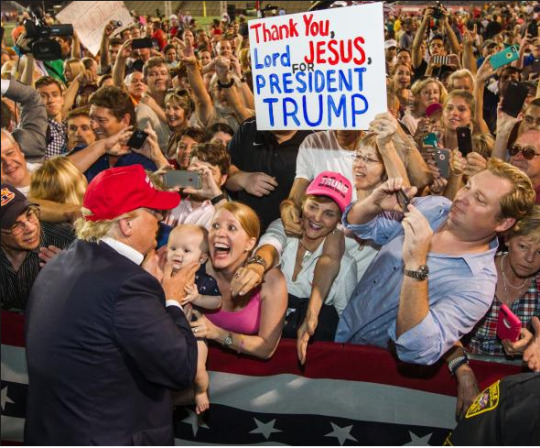
As a result, I’m bereft. Bereft of the country I thought I was living in. Bereft of the people I thought I lived among. Bereft of what I believed was a shared direction despite divergent opinions. Bereft of a belief in the possibility of a common dialogue or even a common reality. Bereft in confidence in basic decency and intelligence. Bereft of the spiritual heritage I was born into, because of course Trump’s most enthusiastic supporters were white Christians. Christians voting for a new Herod with the power of a Caesar is a pretty good joke for the universe to tell, I suppose. He’s even promised to go after the (anchor) babies.
My translation of the Bible is full of all this toff about loving your enemy, about how love of money is the root of evil, about showing hospitality to the widow and orphan and the immigrant, and admonishments against drawing the sword lest you die on it. My reading of the Bible doesn't ask "but who's going to pay for that?" My reading of the Bible suggests to me that if you wish to pretend to care about babies unborn, maybe you shouldn’t be so hostile to the idea of making sure they’re cared for once they are born and inconveniently and expensively needy, and perhaps you shouldn’t make so many of their mothers into the welfare-queen boogie-men of your whole realpolitik, and perhaps you shouldn't make weaponry a right more important than health and food. Maybe healing and wholeness and liberty is something that should be available to even the pagan. Maybe the door is open for the tax collector and the prostitute and the Samaritan. Maybe, unencumbered by the overweening need to be perceived as correct in every moral posture, they've even entered that door ahead of us as we do our best to hold it shut against unworthy access.

Maybe I got a trash translation. Maybe the other ones are all about the joys of using political power for your own aggrandizement instead of the call to self-sacrifice for the benefit of others, about the dangers of anchor babies and welfare mothers, about how paying tax money toward a shared life is tyranny, about how with terrorists you have to kill the families, folks, believe me, kill the women and children, you’ve got to go after the families, and we’re gonna torture again, folks, we’re gonna torture, believe me…
You know what? I believe him.
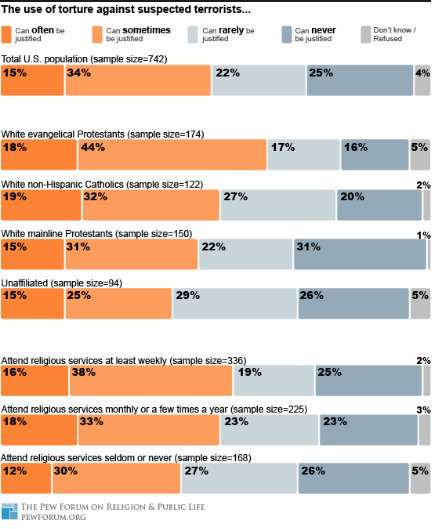
WWJD Check: White Evangelicals are the group most likely favor use of torture by a military superpower.
* * * You wake up and the sky is gone. At times that’s how it seems. You wonder at it: how could there not be a sky? What will become of us now, in this world without a sky? Was it ever there, or did we just imagine it there, as an exercise of collective will?
And then you talk to other people who insist the sky is there. They say: It’s not gone, it’s just red now. Don’t be a sore loser, just because you didn’t want it red. Accept that we did want it red. It’ll be fine if it’s red. And anyway, the banks seem to like it red. Move on with your life. Suck it up. Hope that the red sky will be as good as the blue one. But the sky isn’t red. It’s not anything. It’s just … not. It is a not-ness. An un-sky. A nothing.
And then you start talking to people who laugh, not without compassion, that you ever fell for the idea there was a sky. They say: That big vast emptiness? Oh, yes. That’s always been there for us. Is it there for you now? How… interesting. We can tell you a thing or two about that emptiness, if you’d listen. We’ve been watching it an awful long time.

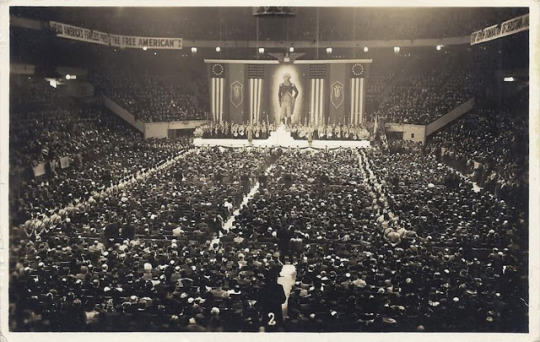
American Nazi Rally, Madison Square Garden, 1939
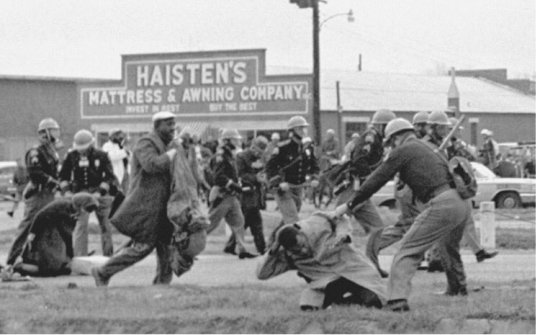
Future Georgia Representative and Civil Rights pioneer John Lewis, beaten by a state trooper on "Bloody Sunday" in 1965.

Oh. Will he. Will he do that.

The sky is the future. Or it was the future. That’s how it seems, at times. How odd, to speak of the future in the past tense.
But the past tense presents us with further troubles. It seems the past is gone, too.
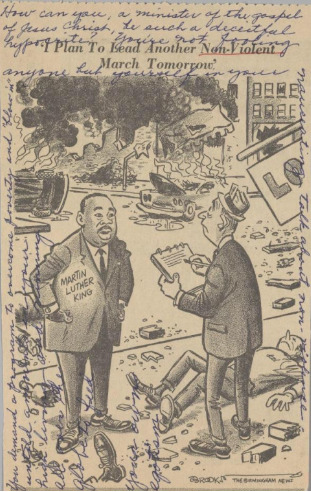
In 1965, everybody thought King was great, and nobody tried to dismiss him by tying him to violence.
Growing up, we were taught that we were a kind and good and just nation. The story we were given was of a nation born of a righteous cause, not quite made perfect by the godlike men who forged it, but honed to apotheosis over the decades that followed. The destruction of the native nations and their people, ah, tsk, a shame, we’d change it if we could, but unfortunately in the past and unrecoverable. Slavery, a dark stain, but by now expunged entirely. Jim Crow, its shameful cousin, absorbed by a saint named King, who led a boycott (a pleasant and polite and non-disruptive one, it seems, in our memories), then stood on some stairs to give a universally-admired speech about his dream of inclusion, and then, his work seemingly accomplished, having seemingly changed minds forever, ascended harmlessly into the clouds.
Somehow we are never culpable. It was always a long time ago. Mistakes were made, but we’d never make them ourselves. It was always somebody else holding the gun, the whip. We arrived here after that, you see, born blameless, without any afterbirth or shock, into the Greatest Country in the World. Our holocausts we absolved ourselves of, because they served to illustrate not the evil we’d done, but how far we’d come from it. We stood on the prow of the ship, looking forward as we cut new water, not aft looking back at whatever may have been churned up in the wake. Not big on the rear-view mirror, us, not fans of the over-the-shoulder glance. We’d tell ourselves stories of what lay behind. We’d imagine ourselves into those stories of darker times, making ourselves the protagonists. We would have been the ones to build false walls in our home to hide slaves. We would have marched with King. We would have spoken out against the Japanese camps. We would have stood at Stonewall.
Our moral arc bends ever toward justice; an inevitable thing. That was the story.
America was great, because it was good. All the old hits.
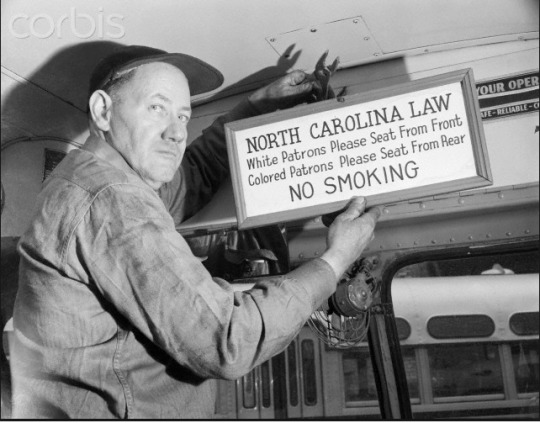
People still alive can remember this sort of thing very well.
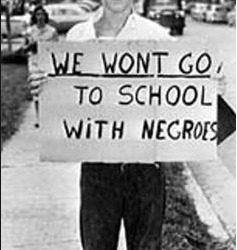
This kid is probably still alive. As are most of his classmates. As are the children with whom he refused to attend school.
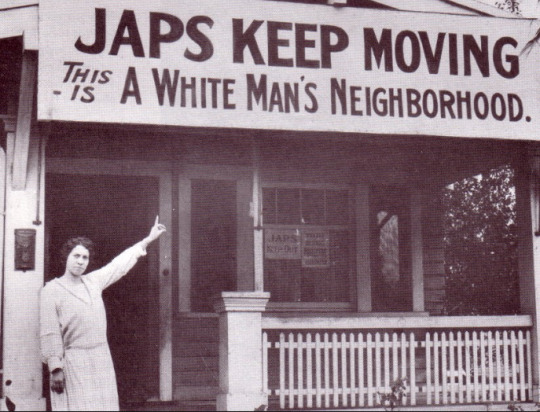
This also happened within living memory.

It's amazing what people consider communism. I mean back then, of course.
Sometimes you’d hear stories about a random injustice or brutality. A policeman who had become a little too enthusiastic. A bad apple, and surely justice was served. If not, it’d have been in the papers You’d hear about it in the papers if it hadn’t been. A gay teen beaten to death in a cornfield. A car with the banner of the struggle to preserve human slavery on the bumper sticker. The KKK marching again, how quaint. Ah, you’d think, if you were like me. We still have some work to do. Cleanup on aisle seven.
Technology has changed that. We see with new eyes now, unless we choose not to. We see videos, dozens and dozens of them now, new ones each week it seems, of police shooting unarmed black people. Again and again and again and again. Can you remember all the names? I can't anymore. And I ask myself: why can't I?
We see the speed with which so many seem willing to seek and find the nearest handy reason the victim deserved his or her fate. We see the news organizations find a Sunday School photo for the shooter and a mugshot to represent the victim. We see acquittal and acquittal and acquittal. We see failure to prosecute.
And, perhaps, we begin to wonder.
We see the people protesting, unarmed, asking only that their lives be thought to matter as much as another’s, and we see the stormtroopers with their massive guns and their tanks, arrayed against a civilian population almost reflexively, like defenses in an organism’s bloodstream mustering against a disease. And we wondered, perhaps: why do they look so much—so exactly, if we’re honest—like an occupying force?

We saw the white ranchers seize government land, pointing their guns directly at law enforcement officials, speaking openly of armed insurrection against the government, of revolution, of war. We saw them, later, seizing a government building. They weren’t protesting after centuries seeing their children and brothers and sisters killed without consequence by authority. Rather, they didn’t want to have to pay a grazing fee. Was it with surprise that we saw it: law enforcement seemed less frightened of these white men and their guns than they had an unarmed black woman in a sundress, or a 12 year old boy playing in a park? Were we surprised to see they seemed so level-headed in this situation, so much less likely to respond with immediate lethal force?
Why, those fellows with their arsenal didn’t even get convicted. They were less threatening to the system, apparently, than a man, arms up, lying on the ground next to his autistic ward begging not to be shot. (He was shot.) We might contrast to the treatment of the protesters at Standing Rock, and wonder…is the Holocaust against native people relegated only to the past? Would we change it, if we could?
We wonder: Are we seeing the system breaking down, unable to cope with new challenges? Or are we seeing a system working exactly as it’s always intended? Do we as a collective of 'white' people secretly want the police to control brown people by force? Are we secretly hoping that force will prove lethal, only occasionally enough to soothe our consciences, but frequently enough to promote an order less immediately costly, than the pain of culpability, than the justice of restitution?
If not, why are prosecutions so rare, and convictions even less so?
If not, why aren’t we protesting these killings? Why aren’t we in the streets?
Do all lives matter? If so, why wouldn’t we act like it?
White Christian America reveres Dr. King, it should be noted. You remember him—the peaceful guy who gave the speech that ended racism. If Facebook and newspaper op eds are any measure, we white Christians can’t stop bringing him up, almost as a cudgel, an admonishment to those today who would dare ask for their own human dignity, for not doing it as antiseptically as we remember it being done by him. And perhaps people begin to wonder: Why was King enshrined as 'the peaceful one' only once he was peacefully dead? Is King’s being safely dead our favorite thing about him? These days, we white Christians can claim to have brought his dream to reality (the white guy is usually the hero of the story in the movie), and Dr. Martin Luther King Jr. will not protest—and we white Christians don’t like protest. Heavens, no—it’s so divisive. Dr. King, he wouldn’t approve of this protest, nor that one, and certainly not that one. His protests were so polite! Why, nobody had any problem with them at all! Dr. King agrees with all of us in white Christian America so much, these days. Oh my, he never stops agreeing with us. Just ask us; we’ll tell you. Yes, and what ever happened to Dr. King, anyway, after he gave that speech that ended all inequality forever?
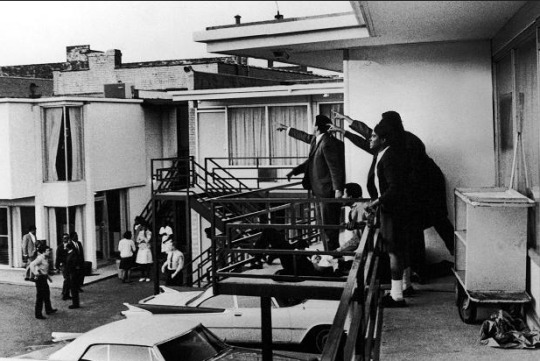
But no matter, I told myself. That’s a dying strain, it's not who we are these days. That’s just a few bad apples. We’ve made so much progress. They’ll exhaust themselves in a final futile sputter. We’re just about to turn the corner. Sure there are racists, bigots, white supremacists, lost-causers, and they're loud, but they're dying out, and they know it. They'll eventually run somebody on an overtly racist platform, and they'll lose huge—I disagree with Republicans, but most of them won't stand for stark white supremacy, surely, and obviously Christians won't be able to align themselves with it — and we’ll show them it’s no use, and they’ll retreat, retrench to even positions even more compromised, less fortified, further back, smaller, diminished. We’re a better country than that.
But then Donald Trump, a half-rate and transparently obvious bullshit artist, a greasy reality TV star most skilled at demonstrating his manifest ignorance, promising mostly the goodness of violence and the strength of vengeance, offering to return America to an earlier time, railing against the inconvenience of practicing sensitivity toward the perspectives of others (he called it 'political correctness'), received 63 million geographically-convenient votes to become the most powerful person in the world. Perhaps, if you’re like me, you took a moment then to ponder that statement about bad apples and what they do to the whole barrel. The meaning of it. And, perhaps, another saying, about recognizing a tree by its fruit. And, it must be said, though we refuse to face it: In America, our trees have long borne a strange fruit.
Here’s what we’ve lost, or at least what I’ve lost: The assumption of goodness’s inevitability. The assumption of goodness of those around me. The assumption of good intent in their hearts. The assumption that the future is still there. The assumption that most of us will die of old age. Here's what I've lost, the one favor Donald Trump may ever do for me: The wool from my eyes. An illusion, particularly a pretty and a convincing one, can be a painful thing to lose.
I’ve gained a vision of tens of millions of people desperate to bend history’s arc back toward an injustice that favored them, and willing to fight for that regression, willing even to risk species-wide extinction rather than suffer the pain of facing the consequences of their own mountainous indifference.
The moral arc of the universe may bend toward justice, but the gears of history grind the weak. There are people now who are giddy, almost with the air of a teenager behind the wheel of a sweet-sixteen hot rod, to test out their perceived new warrant to deliver retributive and violent indifference to the people they deem unlovely. A headscarf yanked off here. A slur shouted in public there. A swastika scrawled on a wall here. A Neo Nazi propagandist advising the President of the United States in the corridors of power there. A crowd of seig heils in a government building, in praise of our new leader here. A few million children stripped of health insurance with no serious attempt at a replacement there.


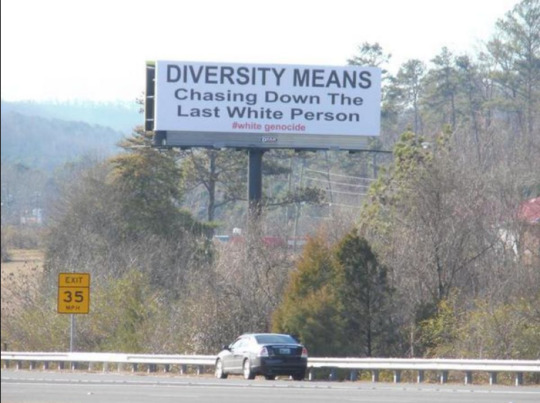


They think this is allowed now. Sixty-three million people, complacently or enthusiastically or ignorantly aligned with white supremacy, gave them the idea it is. It’s going to be our job to show them otherwise. We must show them otherwise. And. Even if you voted for Trump—especially if you voted for Trump—the door is wide open for you to join in that struggle. You show them otherwise, too. All you have to do to join...is join. Your intentions were good? Excellent. I believe you. I've badly misunderstood you? Excellent. I believe you. Now, show it. Show your good intention by your good actions. You, like all of us, possess tremendous moral authority. Don't lend it any longer to those who have promised to squander it on atrocity. They seem intent on doing as they say. If you wait too long, they will leave you with none left to withdraw. Use it to protect those different than you. Use it against your own advantage, for the advantage of those who have none. And. If you, like me, did not vote for Trump, there is the great danger of complicity. You will be offered, if you, like me are white and straight and employed and well-off and cis-gendered and able-bodied and healthy and property-owning, the opportunity to be indifferent. Resist that current.
If the universe bends toward justice, the engine it has chosen for this good work is the hard and sacrificial struggle of good people willing to acknowledge the basic humanity of all other people. People who don’t think profitability is the foundational metric of goodness. People who don't think life holds a value that begins at conception but ends the moment it enters poverty. People bold and willing to become peaceful pebbles in the gears. To give time and money. To link arms with a married gay couple. To take sides in a cafeteria skirmish with a transgendered teen. To take a truncheon in the head for a Muslim. To paraphrase Jesus (another favorite who those of us in white Christian America appear by our words and deeds to consider as safely dead as Dr. King): to live, first you must die.
Or, as another poet says, love’s the only engine of survival.
So, what’s next?
First, we lament. We acknowledge the un-sky, the void. We listen to those who’ve been staring at it far longer than us. We name the challenge with clear eyes. That, I suppose, is what this has been.
And then we get to work. Let us hope our leaders will prove other than than they say they will. Let us not be so naive to think it likely. Let us oppose in a fierce and broken love. Let us meet with friends, we eat good meals with them. Let us consider people before money, and notice where our society fails to do so. Let us make art, and we try to make it well. Let us refuse to allow a comfortable silence to enfold a hateful or ignorant statement. Let us stand up against hate, bodily if necessary. Let us learn our system, and work within it. Let us call our leaders, and advocate for those who suffer. Let us practice generosity without care for the merit of the beneficiary, but only for their need. Let us investigate before we publish. Let us loudly proclaim the humanity others try to diminish. Let loudly proclaim the humanity of those who do not share our values, even as we oppose. Let us never celebrate the suffering of those who oppose us, for they suffer, too. Let us seek to divest ourselves of unearned cultural advantage. Let us enter spaces where our voices are not primary, and listen without thinking to speak. Let us create space to speak, in places where our voices are primary, for those who have had no voice. Let us reject optimism and blind belief. Let us embrace hope. Let us work. Let us work. Let us work. We are a people who have dreamed of the sky. I’d like to see if we can make it real.
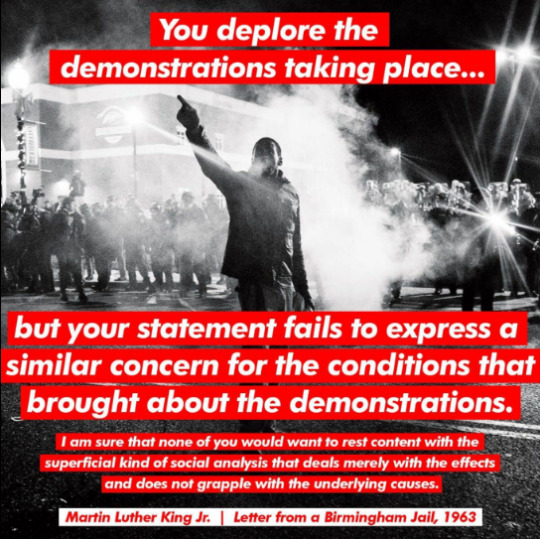

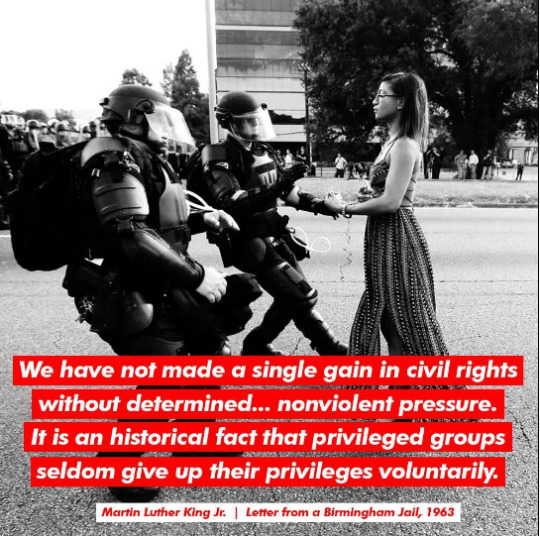
source: http://www.armoxon.com/2017/01/sky.html (January 16, 2017)
VOTE
26 notes
·
View notes
Note
I'm in the animated fandom, and I thought TLJ was a pile of garbage. While I loved the creatures, and they are definitely Filoni-esque, I was not satisfied with many of the story decisions in the movie, along with many of the 'jokes' in it. Everyone's going to tell me that "Luke wasn't the same guy he was when he was young" but I can't imagine Luke entertaining the idea of killing his nephew. I didn't like the "Reylo" stuff, or the fact Kylo chooses to become a one dimensional evil tyrant. (tbc)
I’m going to consolidate both into a single post so I can respond to them all at once:
I hated that Hux was reduced to comic relief even though he was a threatening, cunning villain in TFA and in the books. I was so excited about Finn’s arc, and Rose, but that ended up feeling pointless and with no payoff. Rose really came off as boring, they should’ve tied her into the story more than her just being Finn’s sidekick. Oh, and Snoke was pointless. I don’t care if he gets a book or whatever in the future, it still felt like a waste in the film. Also the movie draaaagged. Just a mess.
First off, I’m sorry to hear that you didn’t enjoy the movie. I don’t think it was perfect, but I think The Last Jedi is a genuinely good film that does a lot really well. I’m going to respond to your individual critiques, but I want to stress that I don’t want you to feel that I am attempting to criticize you or change your mind about the movie. If you didn’t enjoy it, that’s totally fine. I can’t change that about you and you’re unlikely to change my opinion of it. Regardless, here are my thoughts.I’ll address the small stuff first.I never really cared for Snoke. Snoke was always a character that was more interesting in terms of what he was rather than who he was. He’s a big scary evil man that tempted Ben Solo into being Kylo Ren, but he doesn’t really serve much else of a narrative function in both The Force Awakens or The Last Jedi outside of this. I think fan’s latched onto him as a concept and started theorizing about him because JJ crafted him as a deliberately vague character. At the end of the day he is an uber powerful Dark Sider that is not very different from the dozens of ones we have seen in the past both in canon (film, comics, television, novels) or the Legends continuity. Kylo Ren as an extension is a newer form of villain and, in my opinion, significantly more interesting. I really enjoyed how The Last Jedi doubled down on Kylo’s varying aspects of instability both in his volatile emotions but also in his unpredictability. He’s a tortured man who is haunted by a legacy more powerful than he is. That’s a more interesting villain to me than another Force Big Bad who seems to demand some complicated origin story. Snoke’s death also doesn’t prevent him from being discussed in future movies. Kylo could just as easily have a line of “An ancient Dark Side prophet from the outer rim discovered me as a child and crafted me into his apprentice,” or something along those lines and it would cover the majority of the needed background.I also never really got the impression that Hux was really anything but a sniveling “Yes, Man.” His biggest moment in The Force Awakens is when he cries delivering a speech regarding the destruction of a Republic government. I also am pretty caught up on the novels and comics and if I remember correctly, he really isn’t featured much. In general, I enjoy the sort of allegory of the First Order being a well-funded fascist organization that is more or less lead by impetuous man-children (Hux, Kylo Ren) and opportunists (Phasma) who are more concerned with the legacy of a past dictatorial government than in any actual real world politics. Sounds a little familiar right?
The Finn and Rose stuff I do have to agree with you on. I didn’t dislike Rose as a character, but she really failed to make much of an impression on me after my first viewing. I did like Kelly Marie Tran’s performance though and am open to seeing more of the character.
Finn was a disappointment and I totally get why if he was your favorite character in The Force Awakens, The Last Jedi would have been a let down. Personally, I left The Force Awakens with Finn being one of my favorites in the ensemble in that film due to his complicated narrative arc and John Boyega’s incredible energy and charisma. While this remains here, it doesn’t help matters that the narrative Rian Johnson crafts for Finn and Rose just feels like a distraction from the two other narratives occurring which are more emotional involving and more exciting as a narrative. When both characters are playing off the Resistance I think it works rather well, but their sojourn to Canto Bight is by far the film’s low point. That being said, I really dig the fight scene between Finn and Captain Phasma or most of their narrative on the Supremacy.On a surface level, I do understand the frustration with Luke’s portrayal. However, I honestly think it’s my favorite narrative arc for the movie both for who it means for Luke as a character and for the larger meta-narrative of the sequel trilogy. The Last Jedi continues an appropriate reality set up by The Force Awakens where Luke Skywalker is a legend and something approaching a mythological figure: the last of an ancient order of a magical beings that stood at the forefront or a movement that defeated a galaxy-wide totalitarian government. It works because it makes sense in-universe and in our own world because that’s what Luke Skywalker has become for us as viewers. Just as Darth Vader is a paragon of evil, Luke is that light hearted spirit of adventure that ages into adulthood that made the original trilogy so special. He has ceased to become just a person but a larger than life figure, even one that may have something akin to biblical or mythological importance.
However, Luke has always been defined by a push and pull to the Dark Side, even in his redemption for his father there are moments where he hesitates. When he goes to see Ben Solo in his tent it isn’t to kill him but to confront him, but in that moment he is tempted as many Jedi are. He knows that Ben Solo has the ability in him to cause great pain and suffering and to plunge the galaxy into war and further genocide and instability. One of Luke’s defining personality traits has also always been his eagerness and impatience. It’s what Yoda had the biggest difficulty in training him to do. He even has to beg him not to rush off to attack Vader in The Empire Strikes Back before he is better trained because he fears what a conflict such as this would do to him. He is tempted by the Dark Side because of its relative ease and here killing Ben Solo is the quick act that is easiest to solving what he sees as a potential disaster. It’s important here that Luke checks himself though. He feels the pull to the Dark and pulls it back because he realizes that what he is doing is fundamentally wrong. If Luke had gone through with this and tried to actually murder his nephew, than yes, I would be on your side regarding the a potential assassination of Luke’s character, but having that temptation there is important to both him as a character and of the Saga. You can argue that it is maybe a tad too convenient that Ben would wake up to see this and I would be inclined to agree, but hey that’s how stories work.From here I think is where we get into the really meaty stuff with how Johnson and Mark Hamill have characterized Luke here. Luke realizes in this moment that he has failed dramatically. Not only did he let down his nephew, but his sister, his brother-in-law and best friend, and perhaps most damningly this perception that he is some infallible legendary figure. It’s a crushing moment and one that does realistically stick with him for years. What The Last Jedi does that’s really beautiful with Luke’s character is stress just how important these emotional and symbolic heroes can be to those who need them. This is a narrative of Luke coming to understand that he is greater than his failings, but also that the galaxy at large needs heroes like him and that he can still do a great thing for the world and galaxy at larger. So he saves his sister. He saves Rey. He confronts Kylo and he inspires a galaxy. This is what the shot of the little boy at the end of The Last Jedi is meant to symbolize. He’s a young Force sensitive child who carries on through slavery and oppression because of the inspirational symbol of rebellion and of heroes such as Luke. It’s here that The Last Jedi realligns what we know of Luke with what we have come to expect of him. In times like the one’s we are living in now, heroes matter and coming to respond to that and accept that is really beautiful and one of my favorite parts of the film.
#Star Wars#The Last Jedi#asks#ask box#anons#anonymous#Snoke#Supreme Leader Snoke#Kylo Ren#Luke Skywalker#General Hux#Armitage Hux#Finn#Rose Tico#Mark Hamill#Rian Johnson#spoilers#TLJ spoilers#Star Wars spoilers#The Last Jedi spoilers
45 notes
·
View notes
Photo
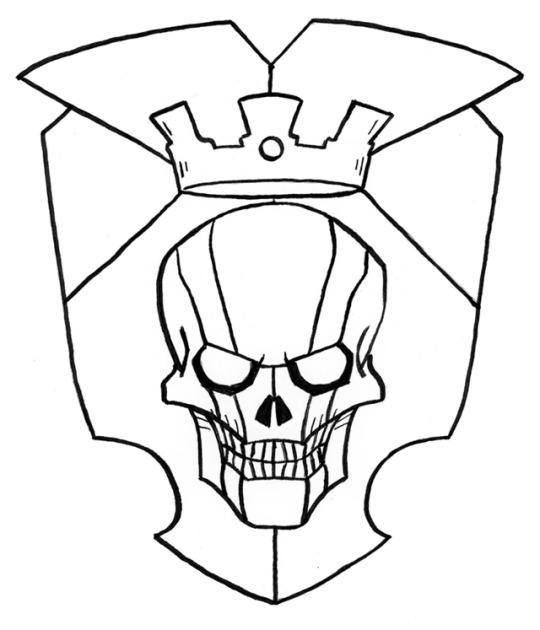
For the return of Krög and in the ramp up for Volume 4, I wanted to introduce everyone to some of the “background” essays I have penned over the years to help keep the culture and history of the Southern Reach straight in my own mind. While these do not directly impact the story itself, they do help (in my mind) lend a degree of realism to a fantasy fairytale world. Called “Essays on the Southern Reach,” I will slowly begin releasing these over the next few weeks. They will ramp up to a new mini series called “The Four Winds Pursuit” that will function as a lead in to the next Krög release!
The first of these essays regards the Battle King lineage Krög comes from. This is one of the oldest culture essays I wrote, so please excuse the fact that it is not, shall we say, grammatically or linguistically sound. It has not been edited, I just thought I would share it. While the kings I call “The Big Four” are mentioned with a degree of repetition (Röm, the First, Lödrek, the Conqueror, Ghömak, the Dragon Slayer, and Mögren, the Tyrant), this essay expands on the entire line of Battle Kings descending from Röm.
Two last notes before the essay itself: one, this is the longest of the essays, so while I do appreciate you reading I also realize how busy we all are... come back to this when you have a few minutes. Second, I cut this essay significantly short to refrain from giving away critical plot elements in Krög’s story. That said, it will end rather abruptly, so please excuse the pacing... and as I said earlier... all the spelling and language issues. Enjoy!
Governance and Leadership within the Southern Reach: An essay on the lineage of Battle Kings
Understanding the reign of the barbarian lords of the Southern Reach, the most primitive and underdeveloped of the Three Known Kingdoms along the Swordsong River, requires an understanding of how their line established itself and came to power. Despite the warmongering, hyperbolic nature of the title held by the sovereign, sole executor for the badlands kingdom, their lineage has largely broken the traditions of warlords taking their lands by force. With few exceptions, most of the Battle Kings to lead over the Southern Reach, while certainly rough hewn and mostly uncivilized given the expansive cultures of their neighboring countries, accomplished their many legacies through measured, tempered management. Even those individuals who reigned as traditional warlords, through intimidation, brutality and military influence, were still regarded as preferable leaders compared to the dictatorial councils of other kingdoms. The culture of the land being focused less on wealth and more on exploration and, so called, adventure, seems to be the primary contributor to this break, but it may simply be the Southern Reach and her Battle Kings were simply a pointed exception to almost all the rules of monarchies during its, nearly, five hundred year existence.
To fully understand the rise of the Battle King line and the fourteen rulers to hold the title, one must first examine the origins of the Three Known Kingdoms on the Swordsong River. The conflict known in the Western Empire as the Raltarian War (alternatively in some places The First Coming of Raltar and The First Raltarian Cycle) saw its early days in 1033 IA (Imperial Age) when a zealot to demon demigod hijacked a magic forge and created the legendary Raltarian Sword. After more than two decades of growing his influence, the zealot declared war on the city of Colossus and in 1068 IA, following a twelve year siege the capital city fell and the Great Flight Across the Boundless occurred. Post exodus, the timeline was rewritten as AC, After Colossus, and during the first year of this age, a great deal of refugees wandered desperately across the Boundless Sea in search of a new country to inhabit. The first of the fleeing pioneers reached the Cape of New Hope early on in 1AC, and it did not take long before more of the refugees pressed further upstream. Please note, there is some overlap between the first recorded years of the AC age, and the final recorded years of the IA age, as while the body majority of citizens from the Western Empire fled its shores, a good deal stayed behind to try to salvage their kingdom, and chronicled those efforts unto their last days.
Officially, the Southern Reach was first settled midway through year 1 AC with the establishment of the war camp, Fort Blaze, where it was overseen by a soldier named Röm. While records indicate Röm may have been a low level officer, he was certainly not a strategic mastermind, but was described in many accounts of his fellows as being a resolute, calm, if often stern man who was looked to for strength. It is surprising Röm managed to carry off such an even demeanor given his wife and three daughters were murdered by pirates preying on ships escaping Colossus before his arrival in the Southern Reach- such tragedy would be enough to break the spirits of most men. Many believe the very spirt of the Southern Reach came from his persistence to carry on in the face of sorrow and adversity in those early days.
Röm was recognized as the first Battle King when Fort Blaze and the small surrounding villages it protected came under assault by troll army from nearby forested areas. By this point, Röm had developed a personal council consisting of Brok, an aged, powerful former Steelblazer whose wisdom was only matched by his combat prowess, and Drake, a bunkmate from basic training who never left Röm’s side. The two provided the Battle King not only with support and advice, but protection as well, and it is largely accepted this is where the tradition of the Senior and Apprentice Honor Guards was born. After several crushing defeats which nearly spelled the complete annihilation of the peoples settling south of the Swordsong River, Röm lead a striking comeback campaign and conquered the trolls, cementing his legacy permanently.
Eventually, Röm would remarry a senior commander in his army and the first Battle Queen, Shay, gave birth to their son Rözar who ascended to the throne following his father’s death in 42 AC. Exhausted by a life raised in the shadows of a bloody war, Rözar sought to expand his father’s kingdom, and his own influence, by engaging in exploration and encouraging frontiersman style settlements. Sometimes called the Homeless Battle King, Rözar, whose actual epitaph read “The Explorer,” spent almost his entire reign on the trails and is credited for pushing the Southern Reach out of the forests on the south bank of the Swordsong River, and into the true badlands north of the Dragon’s Spine’s foothills. The city of Brokus was built under his watch as an outpost to service the better established trade cities on the river, and the agricultural villages which had started to sprawl way from the woodlands. Rather than live out his days in a throne room, Rözar amicably surrendered his throne to his son before setting out into the mountains one morning never to be seen again.
Nömel was a fearless risk taker completely overtaken with his father’s adventuring spirit but with a powerful love of warfare as well. His nickname, the One Armed, came from a teenage run in with a Wild Dragon wherein the creature permanently maimed the, then, Battle Prince, but still fell to his sword all the same. Nömel would go on to learn how to wield a gigantic war hammer in his left hand, and many accept the tradition of Honor Guards carrying similar sledges began with him. While a stout and hearty man of some considerable strength, despite having only one arm, Nömel was a lax and disinterested leader, more focused on increasing his own holdings of trophies and glory than developing a kingdom. At the time of his death in 99AC during a hunting accident, the Southern Reach had largely stagnated.
So came the rise of Lödrek, the Conqueror, the Southern Reach’s first proper warlord and military monarch. In combat, Lödrek was without equal, though he was also resentful of his father’s unfocused reign and determined to use his prowess in battle to return some semblance of respect to the kingdom. He got his chance early on when an insurrection lead by an ogre chieftain burned down Fort Blaze and raided a number of the Southern Reach’s northernmost outposts. Refusing to be vanquished, Lödrek reestablished the barbarian hordes and a personal squadron he called the Warbrands and not only crushed the ogres, but lead a furious, bloody campaign against the rest of the giant kin and fell beasts living within the boundaries of his kingdom. Lödrek flattened much of the forest along the southern bank of the Swordsong River in his conquest, chasing the majority of the trolls into hiding and permanently establishing his country as a military force not to be played at. Until his death in 151 AC to infection of battle wounds, the Conqueror never halted his expansion and taming of the lands around him.
Drökun was a far more sedate and cerebral ruler than his father, and oversaw a long period of peace and prosperity in the Southern Reach, though many attribute this to the scorched earth tactics employed by Lödrek previously. Far less interested in travel and exploration than his forefathers, Drökun saw the need to build protective holdings to keep the more vulnerable municipalities safe from further attack. He earned his title as The Hall Raiser when he centralized the Warbrands in a giant fortress city, Ganithen, and created the Battle King’s palace and throne from one of the last standing trees after Lödrek’s reign. After building the massive battlement to replace Fort Blaze and have a permanent, defendable outpost which served as gateway to the rest of the kingdom, Drökun finished out a quiet rule which he eventually handed over to his son in 180AC.
Following his father’s retirement, Slamdrö very reluctantly took over as Battle King of the Southern Reach without much fanfare or heralding. Even more than his ancestor Nömel, Slamdrö has very little desire to oversee the fledgling kingdom, and did little to expand its borders in his time. Indeed, the major contribution of the 6th Battle King was less his diplomacy or military prowess, but with his establishment of the legendary scouting corp, the Griffin Riders. Preferring the company of beasts over men, Slamdrö was rumored to have stumbled out of a bar one night, take a look at a flock of griffins passing over the moon and proclaiming he would not only ride one, he would make them his family. After domesticating the first clutch, Slamdrö had the tower aviary at Brokus raised where he spent the rest of his time as Battle King training the birds. Easily the most removed of his lineage, his legacy is no less diminished as the Griffin Riders continue to the be lords of the skies wherever they fly.
The next in the line is a matter of some debate and there is a growing community which believes Slamdrö was, in fact, the final Battle King directly descendent of Röm. This follows for a number of reasons. Firstly, Slamdrö was a recluse who never took a wife or maintained very many friends, and there was no proof he ever sired an heir. Secondly, the following Battle King who took the throne following his death in 208 AC, Töban, was even more infrequently seen. Nicknamed the Bone Crusher and presumably possessed of truly legendary, impossible strength, Töban was storied for his unverifiable perfection. By all written accounts of the lords and elders who supposedly served with him he was ridiculously mighty and boisterous, a true barbarian’s barbarian, but almost no accounts from his municipality confirm his existence. There is even a total lack of record supporting the existence of his Honor Guard team. The supposition goes after Slamdrö passed on without leaving a son behind, the regional governors and warlords fell into disarray trying to elect a suitable replacement, and created a mythological, perfect Battle King to keep the municipalities in line. Whether he existed or not, the Southern Reach persisted and Töban’s “son” or successor was a far more visible leader.
In 252 AC, Förak the Blacksmith came into power. Believing the Battle King line had become to removed from the people they both lorded over and protected, likely by the example of the reclusive Slamdrö and absent Töban, Förak sought to reestablish the position as a leader of people and frontiersman. A talented craftsman, the 8th Battle King visited more of the outlying cities than any other of those who came before him and worked side by side with his citizens every single day. He sweat and hammered with them, tended fields and built weapons to gain a greater degree of understanding and appreciation for the subjects living in the badlands away from the most direct protection of the Fortress City. While Förak contributed little in the way of advancing the kingdom, he was instrumental in restoring the people’s faith in their warrior monarch who was as much their defender as he was their ruler. Förak was one of the most mourned Battle Kings on his death in 283AC, legendarily having a wake which stretched for miles.
The lineage returned to form with Förak’s son, Makö, nicknamed The Mighty. With a far bolder vision and ambitions than his father, Makö sought to once again expand the borders of the Southern Reach, wildly envious of the expansive Northern Empire and Eastern Collective, and madly inspired by the tales of Nömel and Lödrek. The Mighty managed to fairly successfully marry the legacies of his many inspirations and pushed the edges of his kingdom farther southward where he established the outpost of Strömlan to keep back the hunting packs of Wild Dragons which lived in the caves of the mountains at their deepest border. Makö was known to have hunted and killed dragons, trolls, ogres and the newly discovered cavelings and cliffbeasts in single combat just to prove his own strength and indomitable spirit. Ultimately he failed to improve the Southern Reach’s standing among the Three Known Kingdoms very much, but did a great deal to reinvigorate the legacy of the Battle Kings.
Makö passed in 320 AC and the throne went to his son Ghömak who began one of the most legendary campaigns accredited to the Battle King line- the Grand Dragon Purge. Believing the Battle Kings were more symbolic as myth forgers than they were effective as world leaders, Ghömak set his sights on passing into truly storied realms by cutting the most powerful, most revered dragons from the very skies. By sheer volume and numbers, Ghömak the Dragon Slayer successfully tracked and killed more dragons than any of his predecessors or any of his successors had or would. With an insane twinkle for want of glory in his eyes and a broad set of shoulders, Ghömak threw hundreds, if not thousands, of his barbarians into the hunt to slay the Grands. It actually served to substantially weaken the Southern Reach’s footing in the world by not only depleting its military, but also making it look like a country totally obsessed with bloodshed for the sake of bloodshed. The Dragon Slayer met his end facing down an extremely vengeful Grand named Yinlong who rallied the remaining of his kind to nearly scorch the Southern Reach right off the countryside.
In 344, Mögren took the crown and had to quickly conclude the war against the Grand Dragons victoriously or risk the entire country vanishing and collapsing. By 352 AC, Mögren and his forces had cut the Grand Dragons to only a handful, or chased them completely out of the country, and in late 353 AC the last Grand burned itself alive with its own fire breath on the knoll behind the Fortress City, its ashes charring the hillside permanently and giving rise to the Scorched Hill. Realizing his country was terribly weakened by the campaign, Mögren turned to an iron fisted rule to stabilize the region and drag the kingdom back from the edge of oblivion. His consolidation of power and massive expansion of the barbarian military to the point of making five years service mandatory for not just all men, but all citizens in general, earned him the nickname The Tyrant. Mögren damaged diplomatic relationships with his neighbors, especially the Eastern Collective through war hawking, but the blusterous display of power served to make the other two kingdoms extremely apprehensive about attempting to forcibly annex the Southern Reach. Through brute force, Mögren turned the badlands country into a force to be reckoned with and the permanent military might of the region.
The second half of the Tyrant’s reign is subject to much debate and is shrouded in ferocious mysticism. For one, Mögren lived an unnaturally long time and refused to surrender his throne until well into nineties after a nearly seventy years under the crown. Popular legend goes he sold his soul for the influence and power to rebuild his kingdom, even going so far as to promise the soul of his firstborn son as well. Additionally, the Tyrant not only was long lived, but ageless of body and died just as strong and broad as he was in his prime. During his final years, he descended towards a place of madness, and was constantly spouting off about coming shadows to the land and how the young would always being paying for the sins of the old. It is largely speculative Mögren might have been a kind hearted, caring ruler had he come into the throne under different circumstances, but hardship and determination drove him to a place of tyranny in order to ensure the survival of his country. He made the hard decisions and took the staunch action needed for the Southern Reach to persevere and was largely damned for it.
Mögren only gave up the throne two years prior to his death in 413AC to his son Öx, an extremely strong and skilled combatant. More than anything Öx was known for how close he was to his commanders and soldiers, and he was a greater, more talented swordsman than any of them. In fact, the soft spoken, steady man surrounded himself with his Warbrands to the point of it being suspect- Öx seemed to be fearful constantly. While even tempered and gentle, despite his immense size and strength, the Ironclad, as he came to be known for routinely sleeping in his armor, was always tinged with uneasiness as though afraid of something he never spoke on. This only fueled the rumors his father had promised his soul to some unspoken power, and Öx entertained a relatively short rule before vanishing east during an extremely tumultuous period wherein his son had disappeared on a mission west.
With the familial line divided and one Battle King having wandered one direction and his eldest son missing in completely the opposite, the council of elders and warlords seized on the opportunity to attempt to reform the government of the Southern Reach more in the style of their rival, the Eastern Collective. Desiring to reorganize the country as a loose confederacy of semi independent states, their efforts were halted when the Battle Prince Bröghue not only returned, but was stunningly supported by his younger brother Gögan to take the crown. Öx’s apprentice Honor Guard, Xylus the Warbrand, also gave his resounding support to Bröghue which rallied the barbarian armies behind him. Faced with a turning tide of public opinion to reinstate the throne, the council eventually relented and the crown passed to Bröghue in 437AC.
Known to his subjects as The Wise, and his closest friends and family as Big Brö, the twelfth of the Battle Kings is largely revered as the second greatest of the lineage behind only Röm and ahead of more proven warriors like Lödrek or Makö. A wanderer and adventurer of some repute as a Battle Prince, Bröghue immediately settled when taking the throne and went forward with immediately repairing diplomatic relationships with the surrounding countries. He quickly established new and stronger trade and protection treaties with the Northern Empires and promised his son in marriage to the Merchant Lord’s daughter as collateral to the ends of an even tighter tie to their northern neighbor. And though alliances with the Eastern Collective continued to suffer, more perhaps due to political upheaval within the eastern states themselves, Bröghue did manage to stave off outright war with them for the majority of his rule. He was beloved by both his people, with whom he maintained close solidarity to, his armies, who saw him as an incredibly strong and potent warrior and for the most part his council who were glad to have their voices heard to a greater degree than under Mögren.
0 notes
Text
EXPOSED: Trump Caught Sneaking Someone Horrifying Into White House.
Donald Trump just signaled the end of America’s moral leadership on the international stage by inviting one of the world’s WORST human rights’ violators to the White House. That’s right, Trump decided to spend some buddy-buddy time with his fellow despot, Philippine President Rodrigo Duterte.
What we know so far about this story is astounding. Trump literally bypassed both the State Department and the National Security Council and directly invited Duterte to the White House, leaving both agencies in the dark.
And what’s worse is that Duterte has NO PLACE coming to America at all, much less the White House. Duterte is currently leading a genocidal purge of drug users in the Philippines. And he clearly wants to exterminate them ALL.
“Hitler massacred 3 million Jews,” Duterte recently commented (actually, the number is between 5 and 6 million). “Now, there are 3 million drug addicts [in my country] … I’d be happy to slaughter them.”
Yep, this is the kind of man that Trump is buddying up with. Even as he tanks all of America’s traditional alliances, Trump is OUTRAGEOUSLY cozying up with the dictatorial Putins and Dutertes of the world.
That tells you EVERYTHING you need to know about the kind of leader Trump wants to be. The Orange Tyrant doesn’t see Duterte as a perpetrator of crimes against humanity, he sees Duterte as someone to EMULATE.
John Sifton, an advocate with Human Rights Watch, LAMBASTED Trump’s spineless invitation to Duterte. In Sifton’s mind, Trump has officially endorsed and thus is complicit in, Duterte’s reign of terror.
“By essentially endorsing Duterte’s murderous war on drugs, Trump is now morally complicit in future killings,” Sifton said. “For Trump to celebrate somebody who boasts of killing his own citizens, and then invite him to the White House while remaining silent on his disgusting human rights record, sends a terrible message.”
“It says to the world that illegal violence is legitimate,” Sifton said. “And that rule of law and human rights can be ignored.”
That’s why it’s no understatement to say that Trump is leading the world, and not just America, into a new age of tyranny. He’s telling the world that it’s time for ALL tyrants to stand together, whether they are in America, the Philippines, or Russia.
POLL: Should Duterte be BANNED from the White House?
Where do you stand? Do you think the White House should welcome someone like Duterte?
Please take our poll below and make your voice heard. It’s time for real patriots to speak out!
function googleBarChartInit() { google.charts.load('current', {packages: ['corechart']}); google.charts.setOnLoadCallback(drawChart); function drawChart() { var data = google.visualization.arrayToDataTable([ ['Answer', 'Count'], ["Yes", 0], ["No", 0], ]); var options = { title: 'POLL: Should Duterte be BANNED from the White House? results' }; var chart = new google.visualization.PieChart(document.getElementById("poll_values_5277")); chart.draw(data, options); } }
If Trump had things his way, he would definitely prefer America to be more like Russia or the Philippines. That way, he could purge his enemies and have free reign to enact his tyrannical agenda. For the good of American democracy itself, we Progressives MUST prevent Trump’s vision for the world from winning out.
Join us today in the fight against Trump. There’s no more room for complacency, that much is clear.
Please share this story far and wide on Facebook. The American people need to know who Trump’s REALLY cozying up to.
The post EXPOSED: Trump Caught Sneaking Someone Horrifying Into White House. appeared first on Learn Progress.
from EXPOSED: Trump Caught Sneaking Someone Horrifying Into White House.
0 notes
Photo
staMy man, I hate to break it to you, but if you justify hanging every SS and Gestapo officer because they were part of a dictatorial regime, then I have bad news for you because that describes our current situation.
Dictatorship doesn’t just mean “there’s a single person at the top that makes all the rules.” We’re living under the dictatorship of the bourgeoisie. The bourgeoisie make the rules, the bourgeoisie run and maintain all levels and functions of government, and the bourgeoisie decide who the cops go after, and why.
And who are their targets? Poor people. Wealthy people get cushy deals and cherry plea bargains, if they’re prosecuted at all. When they are, it’s usually because they fucked with the money of other rich people, like Bernie Madoff.
No, by necessity the greatest preponderance of the “justice” system falls on the backs of the poor.
When George Bush launched his illegal wars, who was standing between protestors and the guilty?
Cops.
When the economy imploded, who kicked people out of their homes? Cops. Who stood between the dispossessed and the people literally responsible for ruining their lives?
Cops.
When people got fed up and started organizing during Occupy, peaceably assembling in public places to air their grievances, who surveiled them, harassed them, and eventually swooped in to assault and beat them until they left?
Cops.
Cops are an occupying army. They kill upwards up 3 Americans a day, and that’s just based on what we can estimate because cops don’t keep statistics on who they murder. Since 2001 cops have killed more Americans, 1500+ a year, than have died in the WTC, Afghanistan, and Iraq combined.
What “tyrants” are they stopping from “taking control?” They didn’t seem too bothered when Trump came to power. They don’t appear particularly disturbed over encroaching fascism, the ever expanding surveillance state, or the imminent danger faced by people by, say, these abortion bans, the state’s utter inactivity regarding stopping climate change, or the pharmaceutical corporations that facilitate and profit from the opioid crisis.
“People who regularly rely on police?” What exactly are they “relying” on? The police are under no obligation, legal or otherwise, to help you or anyone. They have no responsibility for your safety and no obligation to see to your well being in the least. They’re simply the arbiters of state violence and exist only to inflict that violence on those that the state opposes.
They aren’t enemies because they participate in capitalism. Everyone does to some greater or lesser degree. It’s unavoidable due to the complete penetration of capitalism into every facet of society. However, there’s a significant difference between incidental participation out of necessity and making the active choice to be capitalism’s enforcer.
If you’re a communist, if you desire communism like you say, then you cannot support the cops because the cops do not support you.
In case of actual danger, the social democracy banks not on the “Iron Front” but on the Prussian police. It is reckoning without its host! The fact that the police was originally recruited in large numbers from among social democratic workers is absolutely meaningless. Consciousness is determined by environment even in this instance. The worker who becomes a policeman in the service of the capitalist state, is a bourgeois cop, not a worker. Of late years these policemen have had to do much more fighting with revolutionary workers than with Nazi students. Such training does not fail to leave its effects. And above all: every policeman knows that though governments may change, the police remains.
[...]
To this Bruening could reply, unless he preferred silence: “With the police force I could not handle Fascism even if I wanted to; but I wouldn’t even if I could. Setting the Reichswehr in motion means only splitting the Reichswehr, if not throwing it altogether against us. But what is most important is that the turning of the bureaucratic apparatus against the Fascists would mean untying the hands of the workers, restoring their full freedom of action: the consequence would be precisely those which you, social democrats, dread so much, and which I accordingly dread twice as much.”
The effect which the appeals of the social democracy produce on the state apparatus, on the judges, the Reichswehr and the police cannot fail to be just the opposite to the one desired. The most “loyal” functionary, the most “neutral”, the least bound to the social democracy can reason only thus: “Millions are behind the social democrats; enormous resources are in their hands: the press, the parliament, the municipalities; their own hides are at stake; in the struggle against the Fascists they are assured of the support of the Communists; and even so these mighty gentlemen beg me a functionary, to save them from the attack of another party comprising millions whose leaders may become my bosses tomorrow; things must be pretty bad for the gentlemen of the social democracy, pretty bad for the gentlemen of the social democracy, functionary, to think about my own hide.” And as a result, the “loyal”, “neutral” functionary who vacillated yesterday, re-insures himself without fail, i.e., ties up with the National Socialists, to safeguard his own future. In this manner the reformists who have outlived their own day, work for the Fascists along bureaucratic lines.
Today’s cops are tomorrow’s Schutzstaffel. That’s the only thing you can count on from cops.

Wholesome compares to cops killing innocent people in America.
213K notes
·
View notes